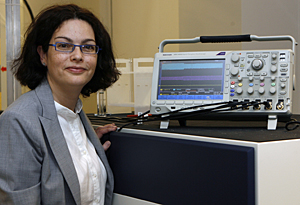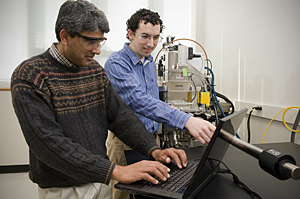

ADVERTISEMENT
- Rozovsky wins prestigious NSF Early Career Award
- UD students meet alumni, experience 'closing bell' at NYSE
- Newark Police seek assistance in identifying suspects in robbery
- Rivlin says bipartisan budget action, stronger budget rules key to reversing debt
- Stink bugs shouldn't pose problem until late summer
- Gao to honor Placido Domingo in Washington performance
- Adopt-A-Highway project keeps Lewes road clean
- WVUD's Radiothon fundraiser runs April 1-10
- W.D. Snodgrass Symposium to honor Pulitzer winner
- New guide helps cancer patients manage symptoms
- UD in the News, March 25, 2011
- For the Record, March 25, 2011
- Public opinion expert discusses world views of U.S. in Global Agenda series
- Congressional delegation, dean laud Center for Community Research and Service program
- Center for Political Communication sets symposium on politics, entertainment
- Students work to raise funds, awareness of domestic violence
- Equestrian team wins regional championship in Western riding
- Markell, Harker stress importance of agriculture to Delaware's economy
- Carol A. Ammon MBA Case Competition winners announced
- Prof presents blood-clotting studies at Gordon Research Conference
- Sexual Assault Awareness Month events, programs announced
- Stay connected with Sea Grant, CEOE e-newsletter
- A message to UD regarding the tragedy in Japan
- More News >>
- March 31-May 14: REP stages Neil Simon's 'The Good Doctor'
- April 2: Newark plans annual 'wine and dine'
- April 5: Expert perspective on U.S. health care
- April 5: Comedian Ace Guillen to visit Scrounge
- April 6, May 4: School of Nursing sponsors research lecture series
- April 6-May 4: Confucius Institute presents Chinese Film Series on Wednesdays
- April 6: IPCC's Pachauri to discuss sustainable development in DENIN Dialogue Series
- April 7: 'WVUDstock' radiothon concert announced
- April 8: English Language Institute presents 'Arts in Translation'
- April 9: Green and Healthy Living Expo planned at The Bob
- April 9: Center for Political Communication to host Onion editor
- April 10: Alumni Easter Egg-stravaganza planned
- April 11: CDS session to focus on visual assistive technologies
- April 12: T.J. Stiles to speak at UDLA annual dinner
- April 15, 16: Annual UD push lawnmower tune-up scheduled
- April 15, 16: Master Players series presents iMusic 4, China Magpie
- April 15, 16: Delaware Symphony, UD chorus to perform Mahler work
- April 18: Former NFL Coach Bill Cowher featured in UD Speaks
- April 21-24: Sesame Street Live brings Elmo and friends to The Bob
- April 30: Save the date for Ag Day 2011 at UD
- April 30: Symposium to consider 'Frontiers at the Chemistry-Biology Interface'
- April 30-May 1: Relay for Life set at Delaware Field House
- May 4: Delaware Membrane Protein Symposium announced
- May 5: Northwestern University's Leon Keer to deliver Kerr lecture
- May 7: Women's volleyball team to host second annual Spring Fling
- Through May 3: SPPA announces speakers for 10th annual lecture series
- Through May 4: Global Agenda sees U.S. through others' eyes; World Bank president to speak
- Through May 4: 'Research on Race, Ethnicity, Culture' topic of series
- Through May 9: Black American Studies announces lecture series
- Through May 11: 'Challenges in Jewish Culture' lecture series announced
- Through May 11: Area Studies research featured in speaker series
- Through June 5: 'Andy Warhol: Behind the Camera' on view in Old College Gallery
- Through July 15: 'Bodyscapes' on view at Mechanical Hall Gallery
- More What's Happening >>
- UD calendar >>
- Middle States evaluation team on campus April 5
- Phipps named HR Liaison of the Quarter
- Senior wins iPad for participating in assessment study
- April 19: Procurement Services schedules information sessions
- UD Bookstore announces spring break hours
- HealthyU Wellness Program encourages employees to 'Step into Spring'
- April 8-29: Faculty roundtable series considers student engagement
- GRE is changing; learn more at April 15 info session
- April 30: UD Evening with Blue Rocks set for employees
- Morris Library to be open 24/7 during final exams
- More Campus FYI >>
10:26 a.m., Jan. 28, 2010----The University of Delaware Research Foundation (UDRF) has funded five UD projects ranging from development of a novel fuel cell, to understanding the metabolic mechanisms that lead to obesity, in its 2009 strategic initiatives grants competition.
Chartered in 1955, UDRF is a non-profit, tax-exempt corporation that supports fundamental research in all fields of science at the University. It is governed by a research committee of scientists, physicians, and engineers. The grants, which are merit-based and administered by the UD Research Office, focus on assisting untenured early-career, tenure-track UD faculty.
The UDRF strategic initiatives grants specifically support collaborative projects focusing on one of the three research areas emphasized in the University's Path to ProminenceTM strategic plan: life and health sciences, energy, and the environment.
The two-year, $35,000 awards include $25,000 in UDRF funding, which is matched by $5,000 from the provost and $5,000 from the faculty member's respective dean.
“Each project focuses on a strategic priority for the University and involves both a junior and senior investigator, a collaboration that is designed to provide faculty who are early in their careers with valuable mentoring from a veteran researcher,” said Mark Barteau, senior vice provost for research and strategic initiatives.
The 2009 UDRF strategic initiatives program is the second in UD's history. The first grants were awarded in 2008.
The traditional UDRF awards for early-career faculty will be announced in May, Barteau said.
The 2009 UDRF strategic initiatives projects include the following:
Developing a Floodless Fuel Cell -- A fuel cell converts hydrogen and oxygen into water, producing electricity in the process. However, fuel cells are hampered by the fact that their waste product - water -- can collect at the electrodes, reducing power output, an effect called “flooding.” Joshua Hertz, assistant professor of mechanical engineering, and Ajay Prasad, professor of mechanical engineering, are devising a novel fuel cell that uses two electrolytes: one that conducts hydrogen ions, and the other that conducts hydroxide ions. The water byproduct collects in a porous membrane at the interface of the two electrolytes rather than at the electrodes, thus eliminating flooding. Through collaboration with the Intellectual Property Center within the Office of Economic Innovation and Partnerships (OEIP), a non-provisional patent application has been filed.
A Systems Biology Approach to Understanding Obesity -- Obesity is a growing epidemic in the U.S., but the metabolic mechanisms that promote fatty tissue formation (adipogenesis), affect fat storage, and ultimately lead to obesity are poorly understood. Maciek Antoniewicz, DuPont Young Professor and assistant professor of chemical engineering, and Eleftherios Papoutsakis, Eugene du Pont Chair of Chemical Engineering, are using a systems biology approach to characterize fat metabolism in 3T3-L1 fat cells. They also will evaluate the effect of fat-specific protein FSP27, whose knockout in mice increased fat burning and protected the animals from diet-induced obesity and insulin resistance.
Overcoming Efficiency Limits in Organic Photovoltaics -- Solar cells made of organic molecules such as polymers can absorb a large amount of sunlight with only a small amount of material; however, their efficiency -- the conversion of sunlight into electricity -- is low, currently only around 7 percent. In this research project, Matthew Doty, assistant professor of materials science and engineering, and Michael Mackay, Distinguished Professor of Materials Science and Engineering, are developing new optical techniques to probe the photo-physical processes that limit the efficiency of organic photovoltaics and using the results to design new device architectures that overcome these limitations.
Selenoproteins in Human Health -- Sharon Rozovsky, assistant professor of chemistry and biochemistry, and Brian Bahnson, professor of chemistry and biochemistry, are working to elucidate the presently unknown structure and function of selenoprotein K (SelK), which has been shown to reduce internal levels of reactive oxygen species and protect cells against oxidative stress. Their long-term goal is to delineate the biochemical role of SelK, the unique contribution of selenium to its reactivity, and the potential of SelK to be used as a biomarker for a membrane's oxidative stress and hence personalized medicine.
Intelligent Search in Health and Biomedical Science Databases -- Health and biomedical research data are growing at an exponential rate. Taking full advantage of the data will require tools that enable the translation of research findings to patient care. Benjamin Carterette, assistant professor of computer and information sciences, and Cathy Wu, Edward G. Jefferson Professor of Bioinformatics and Computational Biology, are researching models and algorithms toward a search tool that would intelligently combine full-text documents from biomedical research and health databases into a single display, allowing a user to discover new connections between research and care.
While UDRF grants are made primarily in the fields of engineering and the natural and physical sciences, any proposal that uses scientific methods and promises quantitative results is eligible for a grant, regardless of academic department. For more information, visit the UDRF page on the Research Office Web site.
Article by Tracey Bryant
Photos by Ambre Alexander and Kathy F. Atkinson


